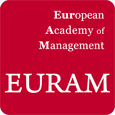 Conference | EURAM – European Academy of Management | Warsaw, Poland | 17-20 June 2015 | Submission deadline: 13 January 2015
Conference | EURAM – European Academy of Management | Warsaw, Poland | 17-20 June 2015 | Submission deadline: 13 January 2015
The next EURAM 2015 conference will feature a track on
Micro-foundations of strategy, dynamic capabilities, knowledge, and ambidexterity.
which is particularly relevant for our research stream on corporate foresight and organizational future orientation.
Organizers
Rob J. G. Jansen, Tilburg University, r.j.g.jansen@tilburguniversity.edu
Asta Pundzienė, Kaunas University of Technology, asta.pundziene@ktu.lt
Mait Rungi, Tallinn University of Technology, mait.rungi@ttu.ee
Valeria Stulova, Tallinn University of Technology, valeria.stulova@gmail.com
Ioannis C. Thanos, University of Glasgow, Ioannis.thanos@glasgow.ac.uk
Description
The topic aims to bring together colleagues interested in recent approaches to the understanding of how firms deal with their environment to achieve (temporary) competitive advantage. This topic aims to investigate how the following approaches inhibit or contribute to this advantage or other outcomes:
How micro-foundations of strategy shape, mediate between, and explain aggregate strategy phenomena (strategic decision-making, strategic consensus seeking);
Dynamic capabilities promoting entrepreneurship, innovation, and organizational learning;
Balancing between internal knowledge accumulation and external knowledge absorption.
The special track is interested in submissions that explore the interconnections between levels of analysis and combinations of the approaches above.
The organizers encourage contributions that are focusing on, but not limited to, the following topics:
1. Micro-foundations of strategy
- individual-level heterogeneity when explaining firm performance
- addressing macro-constructs (e.g. routines) in terms of individual actor’s behaviours
- explaining how the links between macro variables are mediated by micro-mechanisms related to behaviours (e.g. strategic consensus-seeking, issue-selling)
- understanding how strategic dynamics may be rooted in individual characteristics and behaviours (e.g. strategic decision-making, strategy process)
2. Dynamic capabilities
The dynamic capabilities theme aims to stimulate the discourse how dynamic capabilities consolidates entrepreneurship, change management, innovation management, and organizational learning knowledge and in that way contributes to the competitiveness development. The discourse opens new page in dynamic capability research eliminating tautology and providing new insight into the dynamic capabilities empirical research methodology. The topic is composed of several subtopics: shift of the concept of the competitiveness in innovation economy; dynamic capabilities as a paradigm theory; entrepreneurship, innovation, change management, organizational learning and dynamic capabilities; and ways to measure the effects of the dynamic capability.
3. Knowledge strategy
Is learning embedded into strategic goals of organizations and how much does the new knowledge influence strategic choices? How is the balance between internal and external knowledge sourcing achieved? How is the use of outside information balanced by development of internally generated ideas? What are the mechanisms of knowledge processing within a firm? What is the role of absorptive capacity for external knowledge sources? How can the knowledge inflow or creation be adequately measured and how can we capture the influences on organizational performance? Are there time limits to knowledge use? What is the role of employee initiative and cooperation between employees for fulfilment of strategic goals? How do firms adapt to environmental changes? How can a company keep up with fast-paced environment (can a continuing development mind-set be developed)? How do all of the above influence organizational performance?
More information on the track can be found here: https://sites.google.com/site/jansenrjgcom/euram2015 for the more detailed topic description.
For information on submission guidelines and practicalities, please visit the conference website www.euram2015.org